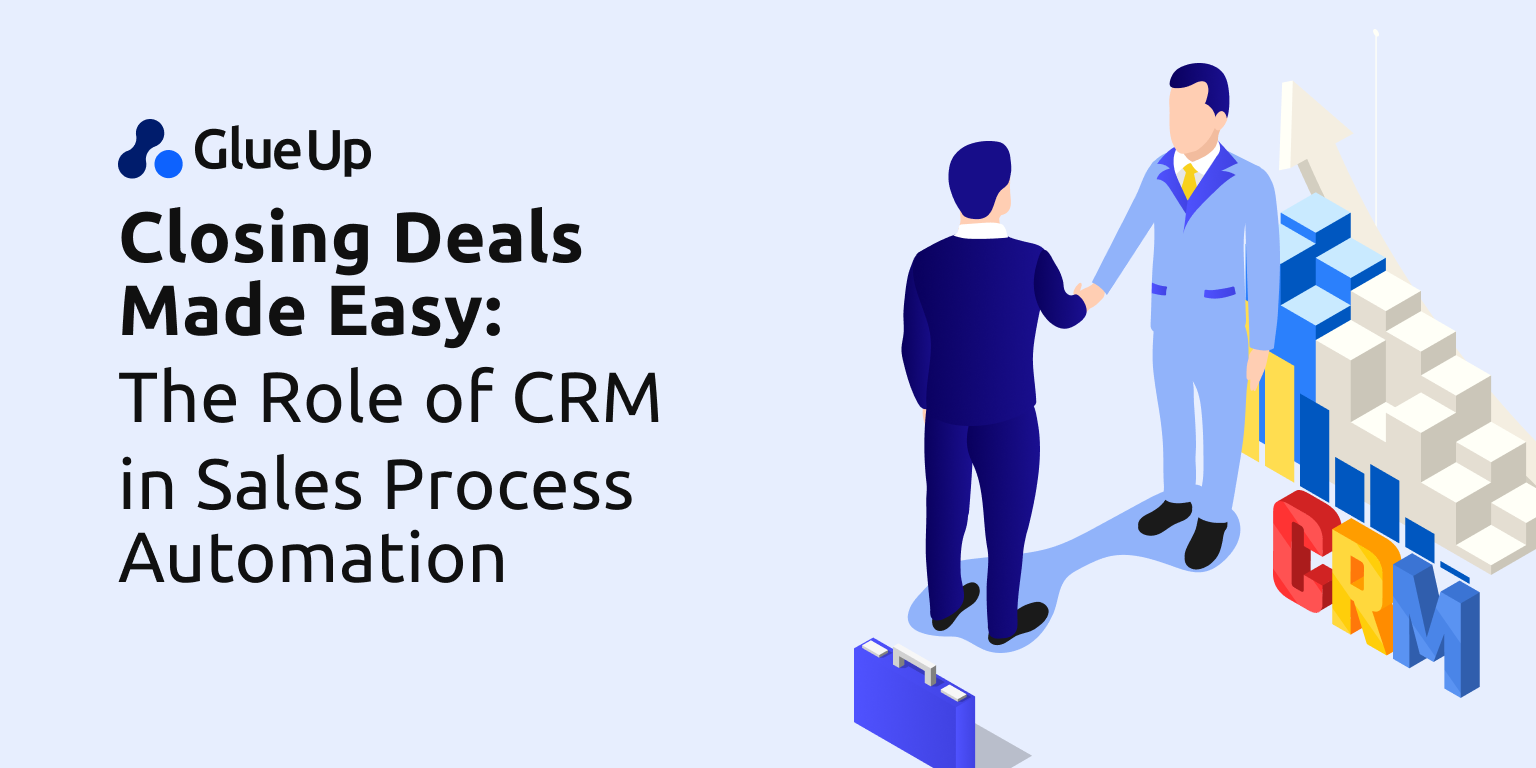
If you’re evaluating tools to automate your sales processes, you’ve likely come across CRMs as the go-to solution. But are they truly helping close deals more effectively, or are they just another tool adding complexity?
This blog breaks down how CRMs impact deal closures by simplifying sales workflows, reducing errors, and keeping your pipeline organized. Discover whether implementing a CRM can streamline your sales automation and deliver the results your team needs.
Let’s explore the facts and see how CRMs can directly influence your sales success.
Key Takeaways
- Sales teams often face disorganized data, missed communication opportunities, and manual tasks that hinder productivity and efficiency, highlighting the need for a centralized solution.
- CRMs improve lead management, enhance communication, provide pipeline visibility, and reduce manual errors, ultimately driving better decision-making and deal closures.
- Modern CRMs are user-friendly, cater to businesses of all sizes, and enhance personal connections by providing insights into customer behavior, enabling more meaningful interactions.
- Selecting a CRM requires evaluating team needs, prioritizing essential features, ensuring scalability, and opting for a platform with robust support and mobile accessibility.
- Glue Up CRM consolidates tools into a single platform, streamlines sales workflows, and provides advanced features like pipeline tracking, automated reminders, and finance history insights. It’s an all-in-one solution that helps businesses focus on closing deals and enhancing member engagement.
From Challenges to Solutions: The Role of CRMs in Sales Success
Before exploring how CRM can transform your sales process, let’s first examine the key challenges sales teams encounter and then explore the solutions that a CRM can provide.
Challenges Sales Teams Face Without the Right CRM

Sales teams face several roadblocks that disturb their productivity and ability to close deals effectively. These challenges include:
- Disorganized data scattered across tools.
- Manual tasks like data entry and follow-ups.
- Limited pipeline visibility, leaving managers unaware of bottlenecks or deal statuses.
- Missed communication opportunities.
- Inconsistent reporting and insights.
- Cumbersome deal closures, causing delays and lost opportunities.
Breaking Down the Impact of CRMs on Sales
The right platform tackles the challenges faced by sales teams by offering innovative solutions. Here are the ways a CRM transforms the sales process and drives better outcomes:
1. Streamlining Lead Management
CRMs let you organize leads in a centralized system, prioritizing them based on factors like engagement levels and the likelihood of conversion.
Features like automated lead scoring and segmentation help sales teams focus their efforts on the most promising opportunities, saving time and driving better results.
These efficiencies contribute to the impressive statistic that CRM software can increase conversion rates by as much as 300%, making it an indispensable tool for sales teams.
2. Improving Communication and Follow-Ups
Effective communication plays a central role in sales, and CRMs excel in this area by centralizing all interaction histories. Stats suggest that 88% of users prioritize interaction tracking features in their CRM platform.
The high demand for these features emphasizes the importance of providing sales teams with a clear view of past interactions to build trust and maintain consistency with potential clients.
Moreover, CRMs centralize communication to ensure no important email or call is overlooked. You can rely on automated follow-up reminders to keep sales teams on top of their pipelines, preventing deals from slipping through the cracks and improving overall efficiency.
3. Enhancing Pipeline Visibility
CRMs provide a clear, real-time view of the sales pipeline, helping teams track progress and quickly identify bottlenecks. When everyone is on the same page regarding deal statuses, collaboration and coordination improve, and the sales process becomes smoother and more productive.
4. Reducing Manual Errors
Manual tasks like data entry are prone to errors, but CRMs automate these repetitive processes, reducing the risk of mistakes. 32% of sales reps report spending more than an hour daily on manual data entry, highlighting the inefficiency of traditional methods.
Accurate data is mandatory for decision-making and helps maintain professionalism and consistency throughout the sales process.
5. Enabling Data-Driven Decisions
CRMs generate powerful insights, including win-loss ratios, sales forecasts, and performance metrics. Sales forecasting accuracy can increase by as much as 42% when businesses use CRM technology, demonstrating how these tools help teams refine their strategies.
These real-time reports empower sales teams to adapt quickly to market changes and make decisions that drive better results.
6. Boosting Deal Closures
CRMs simplify the final stages of the sales process by streamlining workflows and improving team coordination. Features like automated proposal generation and e-signatures reduce friction and create a smoother path to closing deals.
According to reports, 70% of sales reps trust CRM solutions for closing deals, highlighting how these tools help sales teams achieve their goals more effectively.
Common Misconceptions About CRMs

While CRMs have become a standard for modern sales teams, several misconceptions persist, causing hesitation among businesses considering adoption. Let’s clear up some of the most common myths:
CRMs Are Only for Large Enterprises
Many believe CRMs are designed exclusively for large companies with complex operations. However, modern CRMs cater to businesses of all sizes, offering scalable solutions for startups, small teams, mid-sized businesses, and large organizations alike.
Statistics show that 71% of small businesses (500 or fewer employees) now use a CRM system, emphasizing that these tools are essential regardless of business size or type.
CRMs Are Too Expensive
Enterprise CRMs can be pricey, but there are affordable options tailored for small to medium-sized businesses. Additionally, the long-term ROI, averaging $8.71 for every $1 spent, often outweighs the initial investment by driving higher sales and boosting efficiency.
CRMs Complicate the Sales Process
Some assume CRMs are complicated to use, but most platforms today prioritize user-friendly interfaces. The right CRM simplifies workflows, automates repetitive tasks, and helps teams focus on what they do best: selling.
CRMs Replace Personal Connections
Far from reducing the personal touch, CRMs enhance it by providing insights into customer behavior and preferences. This enables more meaningful and personalized interactions.
Adopting a CRM Is Time-Consuming
While implementing any new tool requires effort, most CRMs offer step-by-step onboarding and support. The time saved in daily operations quickly offsets the initial setup effort.
How to Choose the Right CRM for Your Sales Team
Selecting the right CRM for your sales team is an important decision that can directly impact your sales efficiency and success.
Not all CRMs are created equal, and the best choice depends on your team's unique needs, goals, and workflows. Here are the key factors to consider when choosing a CRM:
1. Understand Your Sales Team's Needs
Start by identifying the specific challenges your sales team faces. Are they struggling with lead management, tracking customer interactions, or streamlining follow-ups?
Knowing your pain points guarantees that you select a CRM with features that directly address these issues.
2. Look for User-Friendly Interfaces
A CRM is only effective if your team can use it efficiently. Choose a platform with a clean, intuitive interface that minimizes the learning curve.
You can allow your team to focus on selling rather than spending excessive time navigating complex software.
3. Prioritize Essential Features
Identify the must-have features that align with your sales process. Common features to look for include:
- Lead and contact management
- Sales pipeline tracking
- Automation tools for tasks like follow-ups and email campaigns
- Reporting and analytics for data-driven decisions
- Integration with tools your team already uses, like email or marketing platforms
4. Evaluate Scalability
As your business grows, your CRM should grow with you. Ensure the platform can scale to handle more users, larger data volumes, and expanded functionality without compromising performance.
5. Consider Mobile Accessibility
Sales teams often work on the go, so mobile-friendly CRMs are a must. Look for platforms with robust mobile apps that allow reps to access customer data, update deals, and stay productive from anywhere.
6. Assess Customization Options
Every sales team is different, so the ability to customize the CRM to fit your processes is vital. Check whether the platform allows you to tailor fields, workflows, and reports to your specific needs.
7. Check Reviews and Recommendations
Research what other businesses in your industry say about CRM. Reviews, case studies, and peer recommendations can provide valuable insights into how well the platform performs in real-world scenarios.
8. Set a Budget and Compare Pricing Plans
CRMs come in a range of price points, from free options to enterprise-level solutions. Define your budget and ensure you’re getting value for the features offered. Be mindful of hidden costs, such as additional fees for add-ons or integrations.
9. Take Advantage of Free Trials and Demos
Many CRMs offer free trials or demo versions. Use these opportunities to test the platform's usability features and determine if they fit with your team’s workflow before committing.
10. Ensure Robust Customer Support
Even the best CRM can face technical hiccups. Reliable customer support certifies that your team gets help quickly when needed, minimizing disruptions.
Proof in Action: CRM Success Stories
We’ve already explored the many benefits of using a CRM. Now, let’s examine two real-world examples of CRMs playing a key role in helping organizations overcome challenges and achieve success.
1. Automating Operations and Driving Results: AnzCham Philippines’ CRM Journey
AnzCham Philippines, dedicated to strengthening business relationships between the Philippines, Australia, and New Zealand, faced significant challenges managing their event attendee databases.
The chamber was using multiple tools, which led to disorganized and inconsistent data, causing inefficiencies in engagement and communication. The lack of a unified system made it difficult for the chamber to maintain accurate records and personalize digital interactions, which are critical for modern engagement.
Glue Up CRM provided a comprehensive solution by consolidating all tools into a single platform. This all-in-one approach harmonized AnzCham’s databases, enabling accurate and regular updates while eliminating data inconsistencies.
With features like event page creation, ticketing, and a user-friendly interface, Glue Up CRM streamlined operations and saved the chamber valuable time.
Since adopting Glue Up in February 2019, AnzCham has praised the platform for its ability to centralize workflows, reduce complexity, and handle even the most demanding events with ease.
From Manual Processes to Automation: ItalChamSA’s CRM Journey
The Italian Chamber of Commerce South Africa (ItalChamSA) faced significant challenges managing its operations using manual tools like Excel sheets. These outdated processes created inefficiencies in tracking membership growth, renewals, event planning, and effective communication with members.
Glue Up’s all-in-one CRM solution addressed these challenges by providing a centralized platform that streamlined daily operations. The platform improved database management, enabling easier updates and eliminating irrelevant contacts, which significantly enhanced database quality.
With Glue Up’s automated tools, ItalChamSA could send personalized emails, manage membership applications, and set up efficient renewal workflows, increasing the membership renewal rate to 93%.
Additionally, the CRM solution made event management straightforward with its integrated event ticketing system and templates. ItalChamSA’s annual gala dinner became easier to manage, from ticket bookings and payment handling to attendee tracking.
This journey from manual processes to automation showcases how ItalChamSA leveraged Glue Up CRM to improve productivity, enhance member engagement, and ensure operational efficiency.
Take the First Step Towards Sales Automation with Glue Up

Glue Up's all-in-one CRM is designed to simplify and automate your sales workflows, helping you focus on what matters most—closing deals.
Here’s how our platform streamlines your sales process and drives results:
Sales Pipeline Management
Track and manage opportunities seamlessly at every stage of the sales process. With a clear, visual pipeline, your team gains real-time visibility into deal progress, enabling better decision-making.
Import Existing Deals and Easy Data Management
Easily transition to Glue Up by importing your existing deals and contact lists. The platform’s easy import/export capabilities guarantee a smooth setup without losing valuable information. Features like tags and filters simplify lead segmentation, helping you prioritize high-value opportunities.
Custom Fields and Deal Stages
Every organization is unique, and Glue Up accommodates your specific needs with customizable fields to organize and track deals your way. Define and track the stages of your sales process, certifying every opportunity is managed effectively.
History of Interactions and Task Tracking
With a complete history of all interactions and task tracking, your team can stay organized and confirm timely follow-ups. The task history and contact insights features provide essential details for personalized interactions, boosting the likelihood of conversions.
Custom Reminders and Push Notifications
Automated custom reminders keep your sales reps on track, while push notifications provide real-time updates on critical activities, ensuring no opportunity slips through the cracks.
Finance History and Data Insights
Glue Up CRM also offers finance history tracking, allowing your team to understand past transactions for better client relationships and upselling opportunities. Combined with contact insights and detailed reports, you can make informed decisions to close deals faster.
Glue Up empowers your team to drive revenue with features designed to help you close more deals. Collaborate effectively as all team members can simultaneously track and manage opportunities, making sure nothing falls through the cracks. Book a demo to see how Glue Up can transform your sales process.



